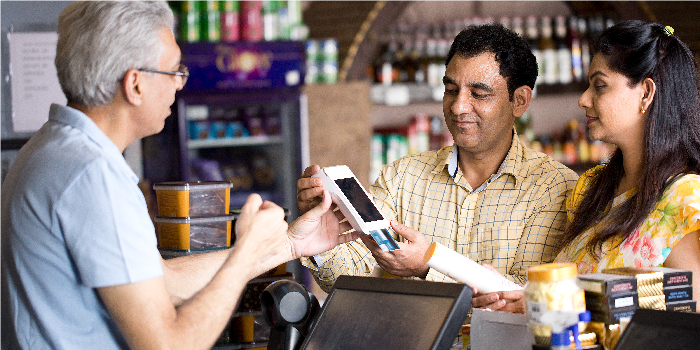India was already at the cusp of transforming into digital economy and the pandemic has further accelerated the adoption India was already at the cusp of transforming into digital economy and the pandemic has further accelerated the adoption of digital payment methods, both at consumer and retailer’s end.
India was already at the cusp of transforming into digital economy and the pandemic has further accelerated the adoption of digital payment methods, both at consumer and retailer’s end. According to a statement by RBI, the Digital Payment Index (DPI) in March 2019 and March 2020 was 153.47 and 207.84 respectively, indicating an appreciable growth. Additionally, the Cisco India SMB Digital Maturity Study 2020 estimated that digitalisation of small and medium businesses (SMBs) could add anywhere between $158-216 billion to India’s GDP by 2024.
Let us understand why MSMEs should opt for digital payments.
To increase business efficiency
Digital payments will help MSMEs improve their business efficiency as every rupee earned and spent is accounted for. All digital transactions can be automatically tallied in accounting software, thus, providing businesses significant help. MSMEs that use digital transactions are benefiting from such control, thereby, administering, planning, and forecasting smoothly. They are enjoying greater transparency in their business.
Furthermore, as these transactions always accounted, generating credit scores becomes convenient. A good score can be used by companies to secure loans when necessary. Today, innumerable MSMEs with good credit scores can meet their business needs.
Many payment players provide integrated payment platforms that aid MSMEs in integrating well-designed ERP suites with digital payment platforms to benefit from data analytics. The merger of a digital payment system with ERP software is granting businesses insights that are helping them reach their goals. Additionally, these platforms entrust MSMEs with utmost security and safety.
To have an competitive edge over the others
With social distancing becoming a norm and contactless payment options gaining momentum, customers have shown a preference towards retailers who offer digital payments for safety and convenience. This suggests that retailers or any solution provider that offers digital payments will have a completive edge in the market.
Digital payments will help companies attract businesses from untapped domestic and overseas market by facilitating the receipt of payment via digital channels. For many small and medium-sized companies, digital payments are presenting the opportunity to develop a national and global footprint. In a globalised world, an extensive footprint is essential for the success of businesses.
To improve Customer Retention
In today’s world, retail is so much more than just payments. Few digital payments player like ONGO offer unique Loyalty programs – app/card based, billing & accounting software, working capital loans etc. Loyalty solutions have become a common thing in tier 1 & 2 cities and are no longer a point of distinction.
MSMEs seek one-stop solution for all their needs. Dealing with multiple vendors for payments, loyalty, billing, accounting etc. has become tedious for them. There are few brands like ONGO, which offer customise digital solutions for all merchant needs.
These value-added services will benefit the merchants by offering new avenues of revenue generation, customer engagement and brand visibility. Instant Motor Insurance by ONGO is another such value added service being coupled with digital payments these days which results in additional income and increased footfall at merchant outlets.
To ensure more secure transactions
Digital payments ensure that transactions are faster, more transparent and negate the process of carrying exact change. When transacting over digital channels, payments are made with a click of a button or by swiping a card, thus ensuring utmost convenience. Customers served by such businesses enjoy an enhanced user experience because they can pay quickly and easily.
From a retailer’s perspective, digital payments facilitate in streamlining a lot of processes. With digital payments one does not have to worry about the fear of theft, discrepancies in accounts, numerous trips to the bank, etc., as all transactions reflect on a real-time basis with utmost transparency.
As the entire process is carried out digitally on a secure platform, the chances of fraud are minimised. In case of a fraud occurrence, the fraudulent transaction can easily be traced. Contactless payments have furthermore removed friction, making more secure as amount is securely deposited to the mobile wallet or bank account which have an encrypted security.
Road Ahead
There are many initiatives put together by the Government and regulatory bodies that encourage businesses to go digital. For instance, the much talked about tax credit for adopting digital payments has the potential to serve as a massive boost to SMEs and MSMEs in India. Other steps such as the scan and pay feature made available since October 1, 2019 is benefiting many MSMEs.
Additionally, with increased digital penetration throughout the country, many new business owners in rural areas can seamlessly transact with their urban counterparts. Digital payments not only reduce payment cycles but also help in blurring geographical lines, thereby making the industry ‘phygital’. Payment players like ONGO make digitisation accessible to tier II and tier III cities through its massive presence across 2200 towns & cities pan India.
With an extensive national digital infrastructure which is continuously being strengthened, MSMEs using it are benefiting immensely. By means of digital transformation, they are streamlining processes, granting access to new markets, improving credit scores, keeping earnings secure, and eliminating fear of errors in ITRs filing, offering value added services and adopting government initiatives that encourage digital transactions whole-heartedly.
The detailed version of this article first appeared on Loksatta Online.


